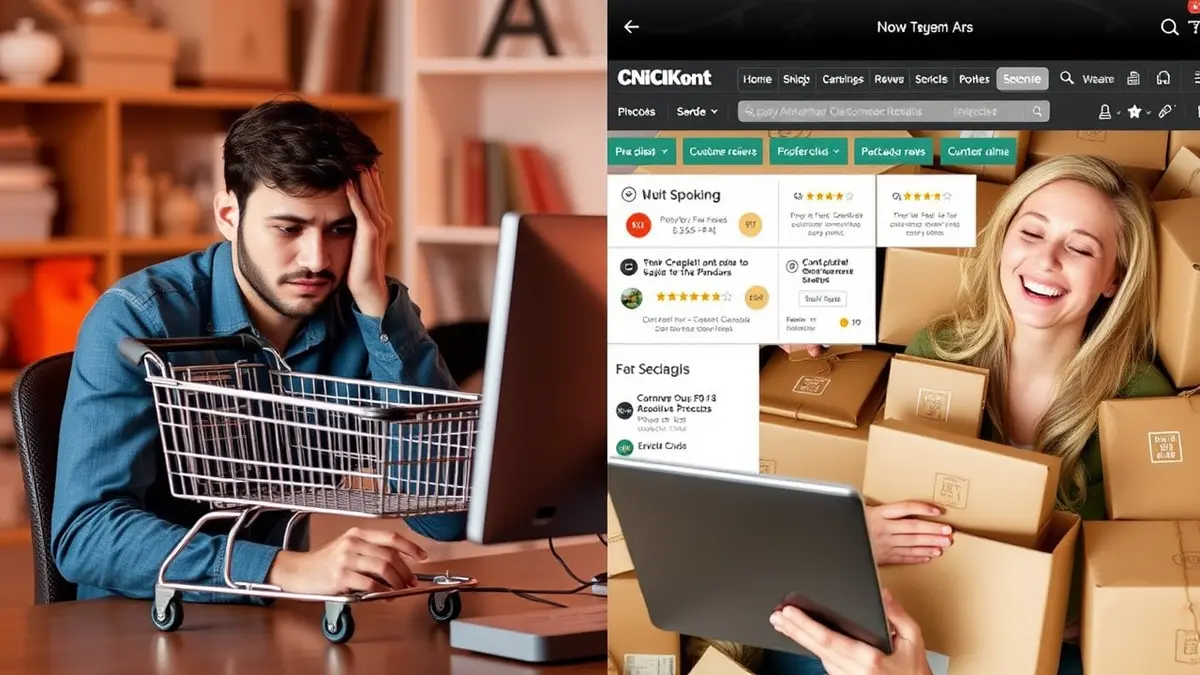Overspending Online? Here's How to Curb Impulse Buys
It’s a familiar scenario, isn’t it? You're just browsing online. Maybe looking for a specific item, maybe not. Next thing you know, you've added three more things to your cart that you absolutely, positively need (or, at least, that’s what you tell yourself). Impulse buys can be a real problem, especially with the constant barrage of targeted ads and enticing deals we face daily.
But don't worry, there are ways to fight back! And no, it doesn’t involve deleting all your social media accounts (though, that might help a little). This is how to curb impulse buys.
1. Understand Your Triggers: Know Thyself (and Your Weaknesses)
What sets you off? Is it the "limited-time offer?" The free shipping threshold? Identifying your triggers is the first step in controlling your spending. Consider which types of products tempt you the most. Clothing? Electronics? Maybe it's artisanal cheese graters (no judgement).
- Keep a Spending Diary: For a week, or even just a few days, track everything you buy online. Every. Single. Thing. Note the time of day, your mood, and what led you to make the purchase. Patterns will emerge. I know, it sounds tedious. But hey, it works.
- Identify Your Emotional State: Are you more likely to impulse buy when you're stressed, bored, or feeling down? Connecting your emotions to your spending habits can be eye-opening. Boredom? Retail therapy might not be the answer.
I remember one time, during a particularly stressful week at work (launching a new website, the sticky keyboard from that coffee spill, ugh), I went on a "treat yourself" spree. Ended up with three new sweaters I didn’t need and a subscription box filled with…well, let's just say it wasn't my finest moment. Recognising that stress was my trigger was half the battle.
2. Implement a "24-Hour Rule": Sleep On It (Seriously)
This is a classic, but it works. Found something you think you need? Add it to your cart (or a wishlist), but don't buy it immediately. Wait 24 hours. Or even better, 48.
- Create a Wishlist: Most online retailers have a wishlist feature. Use it! It’s a great way to keep track of things you're interested in without feeling pressured to buy them right away.
- Set a Reminder: If you're worried about forgetting, set a reminder on your phone to revisit the item later. Chances are, the urgency will have faded.
This gives you time to think about whether you really need the item, or if it's just a fleeting desire. You might be surprised how often you realize you don't actually want it after a day or two. It's all about delaying gratification. A TechCrunch piece last spring hinted at the benefits of delayed gratification, so it must be true, right?
3. Unsubscribe and Unfollow: Out of Sight, Out of Mind
This might seem drastic, but it's incredibly effective. Unsubscribe from email newsletters, unfollow tempting brands on social media, and remove yourself from any marketing lists that trigger your impulse buying.
- Use Email Filters: Create filters in your email to automatically delete promotional emails. Out of sight, out of mind!
- Block Ads: Use ad blockers to reduce the number of targeted ads you see online. Firefox and Chrome, for example, have quite a few options to pick from.
- Curate Your Social Media: Be mindful of the accounts you follow. Unfollow anything that constantly makes you feel like you need to buy something.
It's like decluttering your physical space, but for your digital life. Less exposure to tempting offers means less temptation to spend.
4. Set a Budget (and Stick To It): Know Your Limits
Determine how much money you can realistically afford to spend on non-essential items each month. Then, stick to that budget. No exceptions.
- Use a Budgeting App: There are tons of budgeting apps available that can help you track your spending and stay within your limits. Mint, YNAB (You Need a Budget), and Personal Capital are all popular options.
- Automate Savings: Set up automatic transfers to your savings account each month. This way, you're prioritizing saving over spending.
This helps you prioritize your spending and avoid overextending yourself. Knowing you have a set amount to spend each month can make you more mindful of your purchases. Plus, it provides a great sense of control.
5. Find Alternative Ways to Deal with Your Emotions: Retail Therapy Alternatives
If you're using shopping as a way to cope with stress, boredom, or other negative emotions, find healthier alternatives. Exercise, meditation, spending time with loved ones, or pursuing a hobby are all great options.
- Exercise: Physical activity releases endorphins, which have mood-boosting effects. Go for a walk, hit the gym, or take a dance class.
- Meditation: Even a few minutes of daily meditation can help you manage stress and improve your overall well-being. Headspace and Calm are some apps for this.
- Hobbies: Find something you enjoy doing that doesn't involve spending money. Read a book, learn a new skill, or volunteer your time.
Honestly? This never worked for me until I found a hobby I genuinely enjoyed. For me, it's photography (which, ironically, can be expensive, but I set a strict budget for it!). It gives me something to focus on and a creative outlet that doesn't involve endlessly scrolling through online stores.
6. Be Aware of Marketing Tactics: They're Tricky
Companies spend a lot of time and money figuring out how to get you to buy things. Be aware of common marketing tactics, such as limited-time offers, scarcity claims ("only 3 left in stock!"), and social proof ("100 people are viewing this item right now!"). They’re designed to create a sense of urgency and FOMO (fear of missing out).
- Question the Urgency: Ask yourself if the "limited-time offer" is really that special. Chances are, the item will be on sale again soon.
- Beware of Scarcity Claims: Don't let the "only 3 left in stock!" message pressure you into buying something you don't really need.
- Read Reviews Carefully: Social proof can be misleading. Look for genuine reviews that provide helpful information about the product.
They’re all about getting you to act now, without thinking. And it works. Don’t fall for it.
7. Simplify Your Decision-Making: Reduce Choice Paralysis
Too many choices can lead to overwhelm and impulsive decisions. Simplify your decision-making process by setting clear criteria for your purchases and avoiding endless browsing.
- Create a Uniform: Steve Jobs wore the same black turtleneck every day to reduce decision fatigue. You don't have to go that far, but having a few go-to outfits can simplify your life.
- Set a Budget for Clothes: When it comes to clothes, set a firm budget for the season and stick to it. Only buy items that fit within your existing wardrobe and meet your needs.
- Avoid Mindless Browsing: When you're online, have a specific purpose in mind. Avoid endlessly scrolling through product listings.
This helps you focus on what you actually need and avoid getting sidetracked by impulse buys.
8. The Power of Lists: Shop with a Purpose
Before you even open your laptop, make a list of what you actually need. Stick to it. Don't get swayed by shiny objects. And if you do find something you want that’s not on the list, refer back to the 24-hour rule!
- Plan Ahead: Consider what needs you anticipate having in the near future. This allows you to buy items when they are on sale rather than in a mad rush when you need them at the last minute.
- Keep it Visible: Put your shopping list somewhere you will see it before you start browsing online. This can serve as a mental check and help you resist the urge to stray.
9. Use Tools to Help You Decide: Comparison is Your Friend
There are browser extensions and websites designed to help you compare prices, track price history, and find the best deals. Use them! This can help you make informed decisions and avoid overpaying.
- Price Comparison Websites: Sites like Google Shopping and PriceGrabber allow you to compare prices from different retailers.
- Price Tracking Extensions: Browser extensions like Honey and CamelCamelCamel track price history and alert you when prices drop.
- Coupon Codes: Always search for coupon codes before making a purchase. Sites like RetailMeNot and Coupons.com offer a wide variety of discounts.
10. Embrace the Power of Free: Entertainment Doesn’t Need to Cost
Remember, the internet is more than just a giant shopping mall. Embrace the free entertainment options available. Read blogs, watch videos, listen to podcasts, learn a new language. There are countless ways to entertain yourself without spending money.
- Free Streaming Services: Tubi and Pluto TV offer a wide selection of movies and TV shows for free.
- Online Courses: Coursera and edX offer free courses on a variety of subjects.
- Local Events: Check your local listings for free events, such as concerts, festivals, and museum days.
Bonus: Wishmerge to the Rescue!
And hey, while you're at it, bookmark Wishmerge. At Wishmerge, we deliver daily handpicked deals, trending products, and unique gift ideas from across the web. We scour the internet to find the best discounts and provide direct links to the lowest prices.
We cut through the noise so you don’t have to. No more endless scrolling. Just curated, high-quality deals. Plus, if you are Struggling to Find Gifts? Here's How to Discover Gems, we’re your one-stop shop for inspiration.
So yeah, curbing impulse buys is a process. It takes time, effort, and self-awareness. But it's worth it. By understanding your triggers, setting a budget, and finding alternative ways to deal with your emotions, you can take control of your spending and achieve your financial goals. Now, if you'll excuse me, I have to go resist the urge to buy a new lens for my camera… or maybe just browse Wishmerge for a while. ~Nah, I need to finish this!~~






